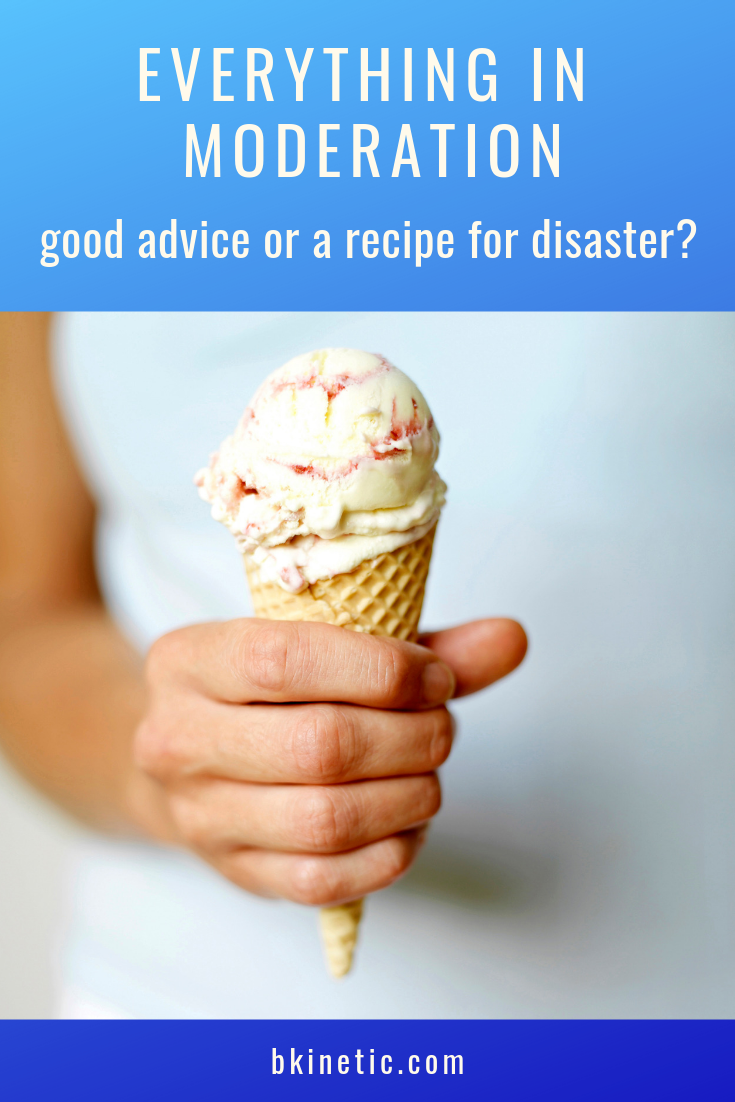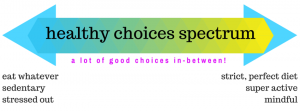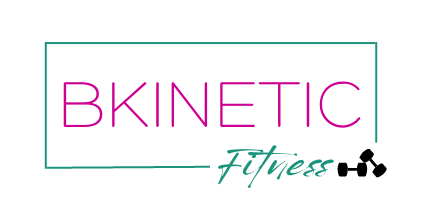 Recently I read a post on Instagram by a Keto diet expert about how moderation is dangerous advice. Cue the chorus of followers chiming in with their anectodotal stories of agreement.
Recently I read a post on Instagram by a Keto diet expert about how moderation is dangerous advice. Cue the chorus of followers chiming in with their anectodotal stories of agreement.
This immediately raised my hackles, but like anything that makes me feel defensive or resistant, I internally examined why I felt that way. While not exactly enjoyable, I find it’s a good practice to constantly question my beliefs, especially when it comes to things I teach others.
First off, let’s define what moderation is not.
Moderation doesn’t mean that you eat whatever you want in whatever amounts you want at any time you want. That’s a free-for-all. That’s the opposite of moderation.

I eat moderately, but I don’t eat an entire chocolate bar in one sitting (or even over the course of one or two days), even if that’s exactly what I want to do. Nor do I order a Venti Caramel Macchiatto at Starbucks even if that’s what sounds the yummiest. I try my hardest not to touch the tortilla chips in the pantry because I know that’s one of my trigger foods, that it’s hard to stop once I start.
True moderation takes into account things like preferences, psychological tendencies (disordered eating patterns, stressors, etc.), food sensitivities and allergies, health issues, goals, and more. It’s different for everyone. It doesn’t mean that you eat all the sugar you want, or eat at McDonald’s every day.
It just means that you live in the middle, the gray area, of the health spectrum, never going to extremes, never striving for non-existent perfection. Never driving yourself crazy with your choices or stressing or obsessing. It’s eating for health and pleasure. In a way that makes sense for YOU. Not your sister or your husband or your best friend. YOU.

For people in the Keto or Paleo or Vegan or whatever diet-of-the-month camp to imply (or even outright say) that moderation means eating nothing but junk and ignoring your body’s needs is just plain wrong and misguided. And don’t get me started on their implication that anyone who preaches moderation “most likely has a food addiction and does not want to be alone in their suffering.” REALLY?!? (Yes, someone really did say that.)
We fit pros who preach moderation understand the concept of food addiction and trigger foods and food sensitivities and intolerances.
None of us want our clients or readers to eat something their body reacts negatively to or that triggers a binge episode.
Even after reading Gretchen Rubin’s books Better Than Before and The 4 Tendencies and reading her section on Abstainers vs Moderators, I’m still firmly in the moderation camp for most people. I agree that there are some people who need an extreme-ish approach for a period of time for health reasons. Like diabetes, autoimmune illnesses, elimination diets for digestive issues (that’s been me several times over the past 2.5 years), heart disease, etc.
But an extreme approach for most people frequently leads to a black-and-white, all-or-nothing view of food. They start attaching a moral value to the food they eat and to themselves when it comes to their compliance to their chosen diet. This is a recipe for disaster!
“We like the idea of an overhaul because it’s feels like a clean slate, we get to become a new person with iron-clad willpower and discipline to never go off plan,” says fitness expert and #moderation365 proponent Jill Coleman.
“Inherent in an extreme approach is that if you veer off it, you are somehow weak or undisciplined or lazy or bad.
The all-or-nothing approach perpetuates the idea that you are either ‘good’ or ‘bad,’ ‘right’ or ‘wrong’. Studies show that when we attach a moral value to ourselves when it comes to food, we end up feeling even more shame, remorse and guilt. And positive psychology research indicates that those negative motivators just don’t work for long term, sustainable habit change,” she continues.
Bottom line, the foods we eat convey information. They react within our bodies with our unique cocktail of chemicals, hormones, effects of stress and activity, and more to produce an effect that we should pay attention to, no matter our chosen approach to eating.
When I finally discovered that gluten was a trigger for extreme bloating and massive breakouts, I quit that shit cold turkey. I don’t do gluten moderation-style, because I know the effects on my body. But I still practice overall moderation when it comes to other foods.
When my doctor prescribed a low-FODMAP diet recently, I didn’t continue to eat high-FODMAP foods in moderation.
I simply found a way to be moderate with other foods. Same when she temporarily put me on the Keto diet and the low histamine diet. They were experiments in healing my body, but I still needed some sort of mental relief to keep me compliant. I created my own version of moderation within those perimeters.
And that’s what these extreme diet coaches ignore. There’s no one definition of moderation. I’m willing to bet that a lot of the people following these diets are practicing a form a moderation. Whether it’s Paleo-fied treats, or Keto versions of their old favorite foods. Maybe they avoid added sugar or grains. But they probably substitute something else that isn’t super crazy healthy in its place to keep things interesting.

Some are super strict and follow these diets to the letter with no deviation. And feel really good within those limits, physically and mentally. And good for them. I just have a problem when they apply that thinking and strict rules to everyone.
I would not ever recommend anyone start with an extreme diet. As an ACE-certified and Precision Nutrition-certified personal trainer, I’m not qualified to do so. And if these health coaches are not registered dietitians, neither are they according to the laws in most states.
I don’t feel the need to bash them in order to make my point like they seem to do frequently. I recognize that everyone has different needs, and that Keto isn’t for everyone. Veganism isn’t for everyone. Paleo isn’t for everyone. The Autoimmune Protocol (AIP) isn’t for everyone.
It’s easy to want to jump on a diet bandwagon as the holy grail of nutrition and perfect health. We all want certainty and answers to what ails us.
We all want to feel energetic and amazing and feel comfortable in our skin 24/7/365.
But what that truly takes is experimentation and an open mind. And if that eventually leads to Keto or Atkins or Veganism or Paleo or AIP or low-FODMAP or low-histamine or whatever, so be it. But don’t get sucked into an extreme approach that leads to feeling like a failure. When you can’t stick to it perfectly or restricting and bingeing or feeling like shit.
And as the great literary genius Oscar Wilde once said, “Everything in moderation, including moderation.”
Need some short yet effective workouts to go with your healthy moderation eating plan? Download your free copy of the Fast Fit Formula workout guide at this link >>> Fast Fit Formula
